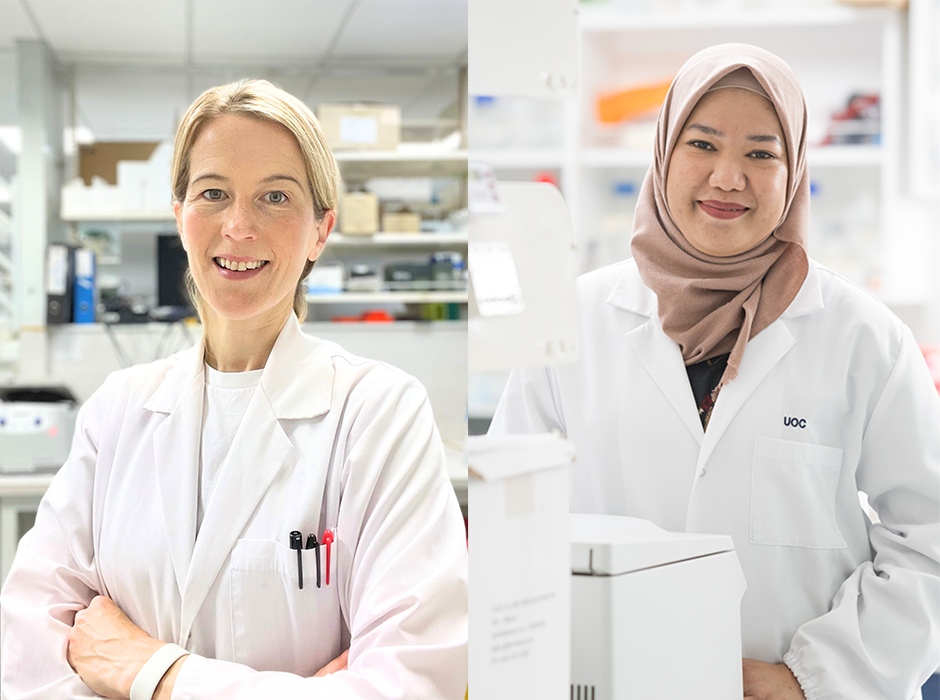
Dr Annika Seddon and Dr Citra Praditi have both received $300,000 fellowships from the Cancer Society to investigate cancer therapy opportunities.
Christchurch researchers investigating opportunities for cancer therapies have been given a funding boost from the Cancer Society of New Zealand.
Two Post-Doctoral Fellowships have today been announced as part of the Cancer Society’s 2024 National Research Grant Round.
University of Otago, Christchurch – Ōtākou Whakaihu Waka, Ōtautahi researchers Dr Citra Praditi and Dr Annika Seddon have both received three-year $300,000 fellowships.
Dr Praditi is looking to advance studies into the role of vitamin C (ascorbate) in cancer, in particular understanding the role it could play as a complimentary melanoma therapy.
“We have the world’s highest mortality rate for melanoma with about 300 New Zealanders dying from this cancer every year,” she says.
“Despite recent advances in targeted and immunotherapy treatments, only some patients respond, and improved treatments for melanoma are urgently needed.”
Vitamin C is a strong antioxidant that is important for cellular mechanisms that can suppress cancer growth.
“Recent high-impact studies have shed new light on the role of vitamin C in cancer, and public interest in its potential as cancer therapy is high.
“What we are hoping to discover with this research is to assess the involvement of vitamin C in epigenetic regulation on the modulation of genome accessibility, and hence gene expression under hypoxic conditions in melanoma cells and in clinical samples.”
Dr Praditi’s fellowship was funded by the MJ Allen Estate, a bequest received by the Cancer Society Central Districts Division.
Dr Seddon hopes her study of malfunctioning mitochondria (the tiny power stations in a cell), will lead to new and better ways to treat acute myeloid leukaemia (AML); a highly aggressive blood cancer that is particularly common in older adults.
“With limited treatment options and poor survival rates, there is an urgent need for better therapies,” she says.
“One of the reasons AML is so hard to manage is because of changes in the chemical marks on the DNA (called DNA methylation) that control which genes are turned on or off.
“These changes disrupt normal cell behaviour and prevent the proper formation of healthy blood cells.”
Dr Seddon’s research investigates how stress in the mitochondria might be contributing to these harmful changes and whether targeted treatments can be used to limit the impact.
“By testing clinically available compounds that protect mitochondria, we hope to restore normal DNA methylation regulation, promote the healthy differentiation of blood cells, and enhance the effectiveness of existing treatments.”
The study will utilise leukaemia cells from both patients and laboratory models to see how these compounds impact cell growth and mitochondrial health.
In collaboration with other investigators at the Mātai Hāora Centre for Redox Biology and Medicine, Dr Seddon aims to understand how increased mitochondrial oxidative stress, which is associated with ageing, affects healthy blood stem cells.
They will promote mitochondrial oxidative stress in blood stem cells and observe if it causes DNA methylation changes similar to those seen in AML.
This could reveal early warning signs of leukaemia development and help identify new preventative strategies.
“Overall, this research has the potential to reshape treatment approaches for AML, making current therapies more effective and paving the way for innovative new options.
“By exploring the link between mitochondrial health, ageing and cancer, this research strives to improve cancer prevention, screening, and treatment, offering hope for better outcomes in patients with this challenging disease.”
University of Otago, Christchurch
Research and study in Christchurch for a career in medicine and health science.
Find out more